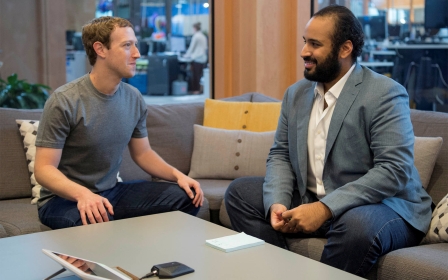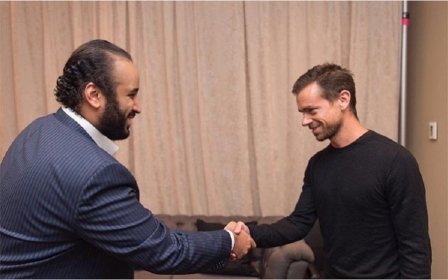US activists: Microsoft 'taking Israeli occupation to a new level’

Anger and frustration is growing towards Microsoft for failing to put an end to its funding of an Israeli tech firm found to be conducting secret surveillance of Palestinians in the occupied West Bank.
Microsoft has been under fire since an NBC News investigation in October found that Israeli start-up AnyVision was not only collecting biometric data of Palestinians at checkpoints but also using facial recognition software to help the Israeli government conduct surveillance on Palestinians in the occupied territories.
Activists from Jewish Voice for Peace, M Power Change and SumOfUs said that Microsoft’s continued investment in the Israeli firm contradicted its own policies on facial recognition. The trio have demanded that Microsoft #DropAnyVision immediately.
“It is appalling that Microsoft has not yet severed its relationship with the company accused of conducting secret surveillance on Palestinians, Granate Kim, communications director of JVP, told Middle East Eye.
The issue came up during a Microsoft shareholders' virtual meeting this week, during which the company and its CEO Satya Nadella were hit by a barrage of condemnation for its continued association with the Israeli firm.
New MEE newsletter: Jerusalem Dispatch
Sign up to get the latest insights and analysis on Israel-Palestine, alongside Turkey Unpacked and other MEE newsletters
Vast reach
In response to NBC News's investigation and a vehement call by activists in the US for Microsoft to divest from AnyVision, Microsoft hired Eric Holder, a former US attorney-general, to conduct an audit into the Israeli firm.
Holder was tasked to investigate whether AnyVision’s practices complied with Microsoft's touted principles on the ways in which biometric surveillance technology should be used to prevent abuse.
A spokesperson for Microsoft said in November that Holder's team "will move quickly, reviewing documents and conducting on-the-ground interviews with AnyVision employees and others to ensure a full and thorough investigation."
But Kim from JVP says that it is unclear what it is that Holder and his team will find that hasn’t already been revealed about AnyVision.
“They could have on their own, at the weight of this investigation, decided to pull out.
“It seems they want to delay and put the responsibility on an outside group to make a judgment call and so shareholders who are fine with these abuses taking place can’t point a finger at the CEO for withdrawing [if they do].”
AnyVision, founded in 2015, describes itself as a leading computer vision company specialising in face, body and object-recognition software.
Israeli newspaper Haaretz describes it as “Israel’s most high-profile biometric recognition firm, particularly in facial recognition”.
So vast is its reach that it said to operate in at least 43 countries and at more than 350 locations, including stadiums, airports and casinos.
Its president is a former head of Malmab, the defence ministry’s security department, while its advisers include a former head of Mossad.
The company has repeatedly denied conducting surveillance on Palestinians and says that its technology is only used at checkpoints.
But NBC News found that AnyVision was the recipient of a top Israeli defence prize for its surveillance technology in 2018. The award was not made public because it was deemed classified and employees were instructed not to talk about it.
AnyVision did not reply to MEE’s request for comment.
Oppression software
Luca Palladino, campaigner at SumOfUs, a global advocacy organisation that campaigns to hold large corporations accountable, told MEE that AnyVision's software was "based on a racially biased algorithm that calculates every move and action Palestinians make".
Whereas non-discrimination, fairness and consent are among the six principles Microsoft adopted for facial recognition, Palladino said, Microsoft's association with AnyVision is in breach of each of these values.
"By partaking in this, Microsoft is not just complicit, it is helping Israel take the occupation to a new level.
- Granate Kim
“Quite simply, the software only exists to oppress and suppress Palestinian people's rights to freedom, justice and self-determination.
"Microsoft must drop its facade of being progressive and drop its association with AnyVision.”
But Shankar Narayan, director of the Technology and Liberty Project at the American Civil Liberties Union of Washington, told Forbes in August that Microsoft’s investment in AnyVision was not out of character for the tech giant.
“This particular investment is not a big surprise to me - there’s a demonstrable gap between action and rhetoric in the case of most big tech companies and Microsoft in particular,” Narayan said.
Microsoft did not reply to MEE’s request for comment or clarification on the stage of Holder’s audit.
An online campaign started by JVP, MPower Change and SumOfUs lobbying Microsoft to #DropAnyVision had already attracted more than 70,000 signatories, organisers said.
“Palestinians do not have democratic rights; their biometric data is being collected without their consent. And to be subject to secret surveillance is appalling,” Kim, from JVP, said.
“By partaking in this, Microsoft is not just complicit, it is helping Israel take the occupation to a new level.”
Middle East Eye delivers independent and unrivalled coverage and analysis of the Middle East, North Africa and beyond. To learn more about republishing this content and the associated fees, please fill out this form. More about MEE can be found here.





